雅思口语高分句式总结
雅思 口语 必背 精简

1. What do you think are the main causes of road accidents?2. Do you know what to do in case of emergency?3. Does your name have any special meaning?4. Where were you come from?5. What kind of landscape surrounds your hometown?6. Will your life change a lot after you immigrate to ABC?7. What is the difference between Beijing and your hometown?8. What are the main places of interest in your hometown?9. What is the climate like in your hometown?10. What is the character of the people like in the region where you live?11. What are the differences in accent between the people of your hometown and Beijing?12. What is people"s favorite food in your region?13. How do you make dumplings?14. What do you do during the Spring Festival?15. Why is the Spring Festival so important to Chinese people?16. Can you describe one of the main festivals celebrated in your country?17. Tell me something about the Lantern Festival.18. Tell me something about the Qing Ming Festival.19. Tell me something about the customs of your country.20. How long have you lived in Beijing?21. What is the weather like in Beijing?22. How do you compare the climate in Beijing with that in your hometown?23. What place in Beijing do you like best? Why ?24. Which is the worst place you"ve been to China?25. Which is the best place you"ve been to China?26. What places in Beijing should a foreigner visit? Why?27. What are the major social problems in Beijing? How can they be solved?28. What is the biggest problem China faces?29. What places in Beijing should a foreigner visit? Why?30. Could you tell me something about your family?31. Have you any children?32. What is your child"s name? Does his name have a meaning?33. What does your wife/husband do?34. When did you get married?35. Describe your wedding.36. How have weddings changed in recent years?37. Are there any special customs about wedding in your region?38. Describe a traditional wedding ceremony.39. Where did you go for your honeymoon?40. Did you have to ask for permission from your parents before you got married?41. Is it acceptable for couples to live together without marrying?42. Where do you think a newly couple should live? Living with their parents or on their own?43. What responsibilities should a couple take?44. How do Chinese usually celebrate birthdays?45. Are there any traditions concerning the birth of a baby?46. What kind of parent do you intend to be?47. What do you think of One-Child Policy in China?48. Why do people in China traditionally want to have a son?49. What difficulties do Chinese farmers have concerning their old age?50. What do you think needs to be done in order to relieve the farmer"s worries?51. What hope or fears do you have for your children?52. What sort of culture do you hope your child will grow up in?53. Are you going to bring up your child differently from the way you were brought up? How?54. Do you enjoy shopping?55. Who does most of the shopping in your family?56. What are you good at cooking? What is your favorite dish?57. Who does most of cooking in your family?58. Is there *** discrimination in China?59. How do you sum up women"s conditions in China?60. What are the causes of *** discrimination?61. Should government pay certain salaries to those housewives? Why or why not?62. Would you want your wife to continue with her career or to stay at home taking care of the household after you get married?63. Have you ever wished to be one of the opposite ***? Why (why not)?64. What would you do if your next-door neighbour were noisy nearly all the time?65. Do you have a lot of friend?66. What does friendship mean to you? What kind of people do you make friend with?67. What is your major?68. How do you like your major?69. When and where did you graduate? What qualifications have you obtained?70. Do you still remember your school days?71. What impressed you most when you were at university?72. Which is the best university in your country?73. Could you sum up your own study habits in a few points?74. What do you think of the practice of setting up key schools in primary and secondary school education in China?75. Do you think the subjects you are studying today are relevant to present-day society? Why ?76. What do you think education should be? Should it be a process of learning what is useful for your future life or should it be simply learning for enjoyment? Why?77. What do you do for a living?78. What do you do in the office every day?79. Since your job seems too professional to me, could you explain it in detail?80. What are your job prospects?81. If you had the opportunity to change your job, what would you do with it?82. Do you have any ambitious?83. Will any possible future changes affect your job in any way?84. What are your spare time interests?85. How do you spend your weekends?86. What is your favorite sport? What are the rules?87. What is the most popular sport in your country?88. What are the sporting facilities like in your university/Beijing?89. What do you know about Qigong? Do you believe in Qigong?90. What do you do in your spare time?91. Do you often read newspapers? If not, why ones do you read?92. What do you think of computer?93. Do you think computer has changed our life so much?94. Do you often go to the cinema/theatre?95. What kind of films do you like best?96. Do you often watch TV? What is your favorite program?97. Do you think watching TV too much is a waste of time?98. What kind of music do you enjoy?99. Who is your favorite film star? Will you describe him/her to me?100. Do you enjoy travelling?101. Where have you been travelling to? Which place interested you most? 102. Do you smoking?103. Do you think smoking is a problem that needs special attention and has to be solved? If so, why?104. What do you know about ABC?105. What problem do you think you will have in ABC?106. How will you overcome the difficulties?107. Do you think you will be able to cope with English-demands of your intended study program in ABC?108. What difficulties do you think you’ll encounter in your studies in ABC? 109. Can you imagine what life in Britain/Canada/Australia/London, etc. would be like?110. How will you fare in Britain/Canada/Australia, etc. without your family? 111. What do you intend to study?112. Which university are you going to study at?113. Why did you choose this university?114. Where are you going to study in ABC?115. What are you plans in ABC?116. What is your research proposal all about?117. What do you hope for most from your study abroad?118. Will your study abroad help your job prospects after come back to China? 119. Should you study more theory or do more practice? Give your reasons, please. 120. What kind of differences in the cultures are you expecting between China and the ABC?121. How will your study in Britain benefit your work in China when you come back to China?122. How will your study in Britain benefit your work in China when you come back to China?123. What do you intend to do after you finish studying?124. What will be your main problem when you are study in a foreign country? 125. What problem can you foresee in the future when you come back to China? 126. Will there be any adjustment problems in your life when you come back to China? If so, what are they?127. Will you have to make any changes in your work/life when you come back to China?128. Do you think there will be a gap between your knowledge gained in China and the level of knowledge you are going to encounter on arrival? If so, what will it be? 129. What do you think of the future of China keeps an open policy?130. What do you regard as the most significant events in your country’s recent history?131. Are there any special places you want to see in Canada? What are they? 132. What do you especially want to do in Canada?133. How do you like your life in ABC University?134. What do you think of the training in the university?135. In what way do you think university training is helpful or falls short?136. What aspect of English do you find the most difficult?137. Do you find American English easier to understand than Britain English? 138. What sports are played in your country?139. Could you describe the traditional architecture of your country?140. What role dose religion play in everyday life in your country?141. What would you regard as the most significant events in your country"s recent history?142. How aware do you think people are nowadays about environmental issues? 143. Could you tell me why you chose to study at the university of ABC?144. What role dose tourism play in your country"s economy?145. How serious is unemployment in your country?146. In your opinion, what are the most serious problems associated with modern life?147. What do you think have been the most important changes in your field over the past 5 years?148. What are you going to major in ?149. Are you going to do your own cooking when you are at university?150. Some local students feel that overseas students get preferential treatment. What is your opinion?151. Do you think you will be able to cope with the English-language demands of your intended program?。
雅思口语之常用句型总结
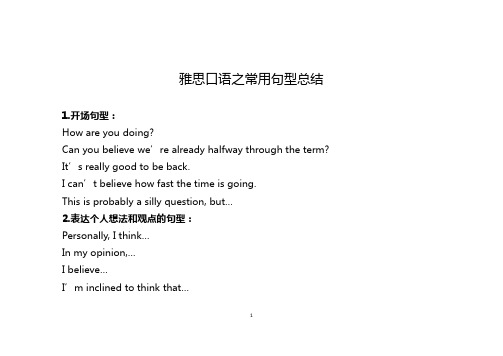
雅思口语之常用句型总结1.开场句型:How are you doing?Can you believe we’re already halfway through the term? It’s really good to be back.I can’t believe how fast the time is going.This is probably a silly question, but…2.表达个人想法和观点的句型:Personally, I think…In my opinion,…I believe…I’m inclined to think that…1Personally, I would recommend…3表达喜欢和不喜欢、喜好和偏好的句型:I really enjoy…I’m passionate about…I can’t stand…I’m not particularly fond of…I’m not particularly fond of doing…4.表达原因和理由的句型:The reason why I like/dislike…is because…One of the reasons why I enjoy…is that…One of the reasons why I find it difficult to do…is because…One of the reasons why I prefer…to…is because…5.表达经历和感受的句型:I remember when I first…It was a great experience.2The last time I…was a disaster.When I was younger, I always used to…It was a lot of fun.One of the best things about…is that you can…It makes me feel really good.6.表达建议和意见的句型:In my opinion, you should…Personally, I would recommend…If I were you, I would…I think it would be a good idea to…Personally, I would avoid doing…because…3。
雅思口语万能句式
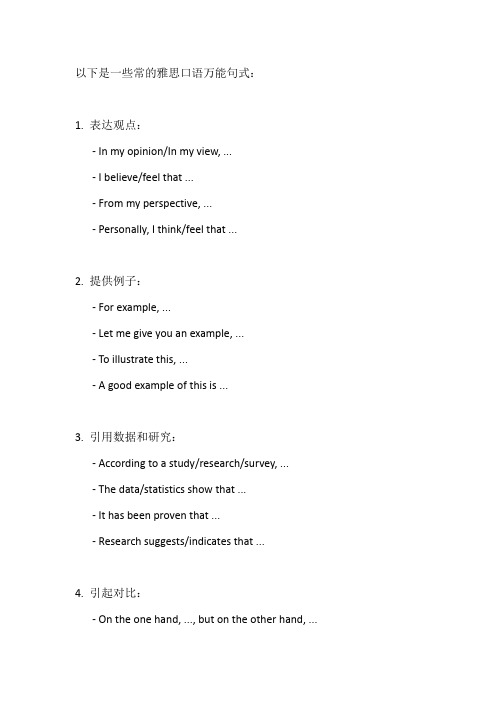
以下是一些常的雅思口语万能句式:1. 表达观点:- In my opinion/In my view, ...- I believe/feel that ...- From my perspective, ...- Personally, I think/feel that ...2. 提供例子:- For example, ...- Let me give you an example, ...- To illustrate this, ...- A good example of this is ...3. 引用数据和研究:- According to a study/research/survey, ...- The data/statistics show that ...- It has been proven that ...- Research suggests/indicates that ...4. 引起对比:- On the one hand, ..., but on the other hand, ...- While ..., on the contrary, ...- Despite ..., ..., on the contrary, ...- However, ...5. 表达原因和结果:- The reason behind this is ...- As a result/consequence, ...- That is why ...- This leads to ...6. 表达喜好和偏好:- I'm really into/keen on ...- I have a preference for ...- I'm a big fan of ...- I enjoy/like ...7. 表达同意和不同意:- I totally agree/disagree with ...- I agree to some extent, but ...- I see your point, but I think ...- I can understand where you're coming from, but ...8. 提出建议:- I would suggest/recommend that ...- It might be a good idea to ...- Have you considered ...- How about ...9. 表达看法改变:- My opinion has changed over time because ...- I used to think/feel that ..., but now I realize/understand that ...- I have come to the conclusion that ...10. 给出总结:- In conclusion/To sum up, ...- All in all, ...- Taking everything into consideration, ...- To conclude, ...记住,使用这些句式时要注意语境和适用性,灵活运用以表达自己的观点和思考。
雅思口语好句
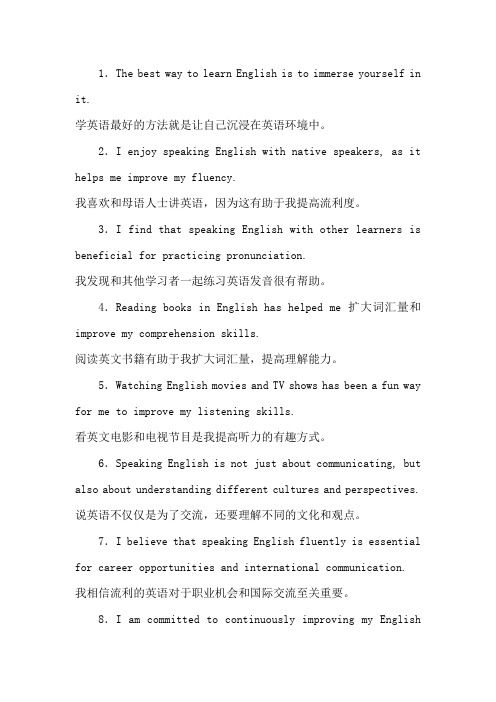
1.The best way to learn English is to immerse yourself in it.学英语最好的方法就是让自己沉浸在英语环境中。
2.I enjoy speaking English with native speakers, as it helps me improve my fluency.我喜欢和母语人士讲英语,因为这有助于我提高流利度。
3.I find that speaking English with other learners is beneficial for practicing pronunciation.我发现和其他学习者一起练习英语发音很有帮助。
4.Reading books in English has helped me扩大词汇量和improve my comprehension skills.阅读英文书籍有助于我扩大词汇量,提高理解能力。
5.Watching English movies and TV shows has been a fun way for me to improve my listening skills.看英文电影和电视节目是我提高听力的有趣方式。
6.Speaking English is not just about communicating, but also about understanding different cultures and perspectives. 说英语不仅仅是为了交流,还要理解不同的文化和观点。
7.I believe that speaking English fluently is essential for career opportunities and international communication.我相信流利的英语对于职业机会和国际交流至关重要。
8.I am committed to continuously improving my Englishlanguage skills for personal and professional development. 我致力于不断提升自己的英语水平,以促进个人和职业发展。
雅思口语part2万能套话
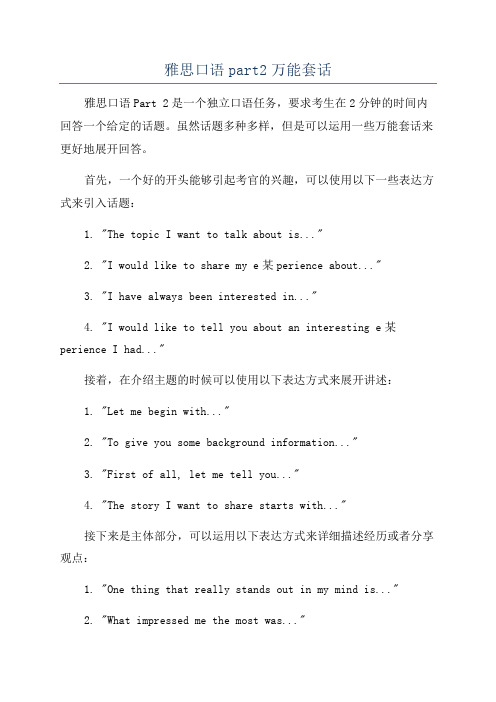
雅思口语part2万能套话雅思口语Part 2是一个独立口语任务,要求考生在2分钟的时间内回答一个给定的话题。
虽然话题多种多样,但是可以运用一些万能套话来更好地展开回答。
首先,一个好的开头能够引起考官的兴趣,可以使用以下一些表达方式来引入话题:1. "The topic I want to talk about is..."2. "I would like to share my e某perience about..."3. "I have always been interested in..."4. "I would like to tell you about an interesting e某perience I had..."接着,在介绍主题的时候可以使用以下表达方式来展开讲述:1. "Let me begin with..."2. "To give you some background information..."3. "First of all, let me tell you..."4. "The story I want to share starts with..."接下来是主体部分,可以运用以下表达方式来详细描述经历或者分享观点:1. "One thing that really stands out in my mind is..."2. "What impressed me the most was..."3. "To my surprise..."4. "What I found interesting was..."5. "From my point of view..."同时,可以使用以下一些句子连接词来过渡不同的段落或观点:1. "Furthermore..."2. "In addition..."3. "Moreover..."4. "Besides that..."5. "On top of that..."在结束时可以使用以下表达方式来总结观点或经历:1. "In conclusion..."2. "To sum up..."3. "To wrap up..."4. "All in all..."5. "In a nutshell..."最后,可以用以下一些表达方式来关闭话题或引入下一个话题:1. "That's all I have to say about..."2. "That brings me to the end of my story/e某perience..."3. "Now, let's move on to the ne某t topic..."4. "I hope you found my story/e某perience interesting..."综上所述,以上是一些可以在雅思口语Part 2中使用的万能套话。
雅思口语高分模板汇总
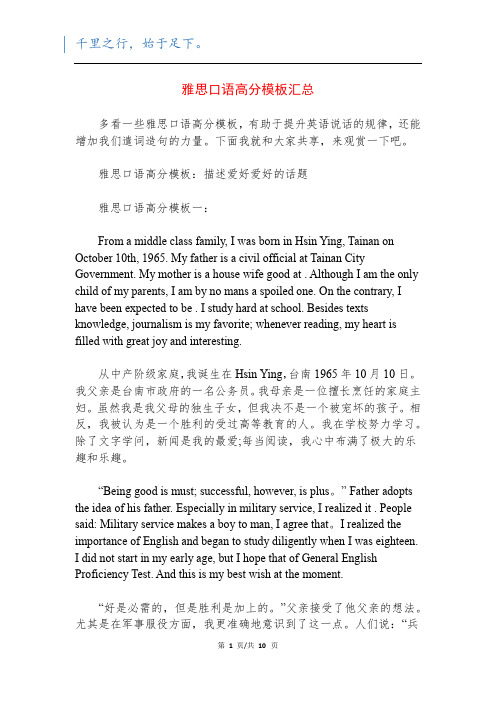
雅思口语高分模板汇总多看一些雅思口语高分模板,有助于提升英语说话的规律,还能增加我们遣词造句的力量。
下面我就和大家共享,来观赏一下吧。
雅思口语高分模板:描述爱好爱好的话题雅思口语高分模板一:From a middle class family, I was born in Hsin Ying, Tainan on October 10th, 1965. My father is a civil official at Tainan City Government. My mother is a house wife good at . Although I am the only child of my parents, I am by no mans a spoiled one. On the contrary, I have been expected to be . I study hard at school. Besides texts knowledge, journalism is my favorite; whenever reading, my heart is filled with great joy and interesting.从中产阶级家庭,我诞生在Hsin Ying,台南1965年10月10日。
我父亲是台南市政府的一名公务员。
我母亲是一位擅长烹饪的家庭主妇。
虽然我是我父母的独生子女,但我决不是一个被宠坏的孩子。
相反,我被认为是一个胜利的受过高等教育的人。
我在学校努力学习。
除了文字学问,新闻是我的最爱;每当阅读,我心中布满了极大的乐趣和乐趣。
“Being good is must; successful, however, is plus。
” Father adopts the idea of his father. Especially in military service, I realized it . People said: Military service makes a boy to man, I agree that。
雅思口语高分模板分享
雅思口语高分模板分享雅思口语高分模板共享今日我给大家整理了雅思口语高分模板,盼望能关心到大家,下面我就和大家共享,来观赏一下吧。
雅思口语高分模板:关于自我介绍雅思口语高分模板一:I am___ . I was born in___ . I graduate from___ senior high school and major in ___. I started learning English since I was 12 years old. My parents have a lot of American friends. That’s why I have no problem communicating with Americans or others by speaking English。
In my spare time, I like to do anything relating to English such as listening to English songs, watching English movies or TV programs, or even attending the activities held by one English clubs or institutes.我是---。
我诞生在----。
我毕业于---。
我从12岁就开头学英语。
我的父母有许多US伴侣。
这就是我为什么说英语与US人或其他人沟通没有问题的缘由。
在我的业余时间,我喜爱做任何与英语有关的事情,比如听英文歌曲,看英文电影或电视节目,甚至参与一个英语俱乐部或讨论所举办的活动。
I used to go abroad for a short‐ term English study. During that time, I learned a lot of daily life English and saw a lot of different things。
雅思口语常用的经典句型
【导语】语法知识告诉我们,英语中的三⼤从句各有⽤途。
定语从句起修饰或包装的作⽤;名词性从句提供信息;状语从句补充说明,增加额外信息量。
以下是⽆忧考整理的雅思⼝语常⽤的经典句型,欢迎阅读!1.雅思⼝语常⽤的经典句型 ⼀、定语从句经典系列 ① (名词或代词) is the kind of (person/place/thing…) who (which/that) is… ② (名词或代词) is a (person/ place…) who (which) gives you the impression ofbeing… ③ (名词或代词)is one of the most (形容词) (名词) I have ever seen/met/known. ④ (地点名称) is a place where you can do sth. ⑤ (时间名词) is a day (occasion/the time) when you do sth. ⼆、名词性从句经典系列 ① The reason why I (admire him/like the place…) is that +从句 ② The most important thing is that+从句 ③ Another thing is that+从句 ④ What I mean is that + 从句 ⑤ What I’d like to say is that +从句 以上名词性从句①到③是引出个⼈观点或信息时的过渡句型,在⼝语表达中可以起到建构框架,使条理清晰层次分明的作⽤。
⽽④和⑤则是⽤于进⼀步解释说明。
套⽤实例: The reason why I admire Yaoming is that he is a legend and also a greatguy. The most important thing is that he is one of China’s most recognizableathletes. What I mean is, his image can be seen everywhere, he is a householdname. Another thing is that Yao has also participated in many charity eventsduring his career. What I’d like to say is that he not only donated money torelief work, but also created a foundation to help those in need. 三、状语从句经典系列 ① I first got to know him/it when + 从句(过去式) ② (名词或代词) have (动词过去分词) since +从句(过去式) ③ If I had the chance, I would like to… ④ If …, then it is quite possible that I will… 以上句型只需稍加变动,便可应⽤于多种话题。
雅思口语高分万能句
雅思口语高分万能句1.与考官打招呼Glad to meet you here.How nice to see you.Fancy seeing you.How are you?I'm glad to have had the opportunity to meet you here. I'm glad to meet you.I'm pleased to meet you.It's a pleasure to meet you.2.没听懂问题Could you please rephrase that question/topic?I'm not exactly sure what you mean…1Do you mean…?If I understand right…I'm sorry if I'm being a little slow, but…?I'm sorry, I'm not sure I understand. Do you mean (that )…?So am I right in saying …?If I've got the picture, then …So what you mean is …, right?Sorry, I don't quite catch you. You mean …?Can I get one thing clear?Would I be correct in supposing …?I'm not exactly sure how to answer that question, but (perhaps)…That's a rather difficult question, but (maybe) …I'm sorry, but I don't know much about3.发表意见2That's difficult to answer, but maybe …I'm sorry, but I don’t know much about …,but perhaps…Maybe I can answer your question by telling you about a personal experience I had. That's an interesting question …let me see. Well, I suppose that …Yes, that's a big issue.4.连接词Well,…Actually …In fact …You see …You know, …How shall I put it…Let me think for a second …Give me a few seconds…35.换一种说法In other words, I am …And that means …Let me put it another way, …What I'm suggesting is …All I'm trying to say is …What I'm getting at is …If I can rephrase that …Perhaps I should make that clearer by sayingPerhaps it would be more accurate to say …The point I'm making is that ..6.回答完毕、结束语I'm afraid that's about as much as I know.I think that's all. 、I can’t think of anything else right now.4That's very kind of you. Thank you.Thank you very much for giving me information.Well, thanks for talking to me and I wish you all the best.Thank you, sir?Nice talking to you.I appreciate your talking with me. Goodbye.I enjoyed talking to you.It's been very helpful talking to you.将考试当作一场稍正式的coffee chat,运用自己熟悉的词汇和句式,认真表达。
雅思口语万能句开头句
雅思口语万能句开头句1. "When it comes to [topic], I believe that..."当谈到[话题]时,我认为……2. "In my opinion, [topic] is a subject that is worth discussing."在我看来,[话题]是一个值得讨论的问题。
3. "As far as I'm concerned, [topic] has both advantages and disadvantages." 就我而言,[话题]既有优点也有缺点。
4. "These days, there is a growing tendency that [topic]."如今,[话题]的趋势日益明显。
15. "It is commonly believed that [topic], but I have my own看法."人们普遍认为[话题],但我有自己的看法。
6. "In recent years, the issue of [topic] has aroused public concern."近年来,[话题]的问题引起了公众关注。
7. "Nowadays, more and more people are paying attention to [topic]."如今,越来越多的人开始关注[话题]。
8. "When it comes to [topic], different people have different看法."当谈到[话题]时,不同的人有不同的看法。
9. "In my view, [topic] is a complex issue that cannot be simply categorized as good or bad."在我看来,[话题]是一个复杂的问题,不能简单地归类为好或坏。
- 1、下载文档前请自行甄别文档内容的完整性,平台不提供额外的编辑、内容补充、找答案等附加服务。
- 2、"仅部分预览"的文档,不可在线预览部分如存在完整性等问题,可反馈申请退款(可完整预览的文档不适用该条件!)。
- 3、如文档侵犯您的权益,请联系客服反馈,我们会尽快为您处理(人工客服工作时间:9:00-18:30)。
雅思口语高分句式总结
1. 当你想说but来转折语气,不妨忍一下,然后在句子后面加个though,立马瞬间洋气了许多!例如:
Our team lost. It was a good game, though。
Middle-aged people like to cook at home, young adults are a bit different, though。
2. 多用副词,例如exactly, basically, really这些副词可以加强或者缓和语气,更准确的表达我们的真实想法。
比如:
That’s exactly what I want!
Where are you going exactly?
So basically, there’s not a lot I can do about it。
The more expensive articles are not necessarily better。
3. 简单不易出错的同位语从句可以为你的语言增色不少哦!例如:
People are now aware of the fact that many restaurants are not that hygienic。
Despite the fact that she was wearing a seat belt, she was thrown sharply forward。
4. 强调句式用起来,也会增加语法的广度哦,例如礼物类话题的.万年句式:
It doesn’t matter how expensive the gift is, it’s the thought that matters。
5. 当你想说most of… 的时候,不妨改口成tend to,词汇量有没有显得多一些!例如:
Most Chinese people cook at home instead of dining out. 就可以说成Chinese people tend to cook at home。
6. 口语答案里面呢,要有意识的尽可能抛弃very,一种方法是用pretty 替代,另一种就直接用个更高级的形容词。
例如:
That performance was pretty impressive。
I’m pretty s ure about that。
还有instead of saying “very angry”, you can use the word “furious”。
那同理,如果我们想表达a little + adj.,也可以找到相应的更传神的形容词,例如:
tipsy = a little drunk
7. 提到形容词,我们可以先把他们分成两类:褒义贬义。
那“广谱”的褒义词就是经常说的fantastic,awesome,terrific,fabulous,fascinating。
“广谱”的贬义词呢,就是awful,terrible,
horrible等等。
当我们在形容好东西坏东西的时候,当然可以用这些词,不过其实对于具体的事物,是有相应的形容词来搭配的,就像我们中文里,“景色真好”和“景色让我心旷神怡”文采是不一样滴!所以,平时注意积累这些形容词,会给你加分不少。
例如:
形容食物:delish,inviting,mouth-watering,scrumptious等等。
形容风景:picturesque,breathtaking,magnificent等等。
8. 形容词前加副词,也是不错的应急措施哦,如果实在想不到高大上的形容词了,就用一个副词来加强一下情感吧,例如:
She’s shockingly beautiful。
It’s an outrageously expensive meal。
9. 同学们在回答考官问题的时候,其实自己也觉得说个No很伤感情,那怎么能用比较不伤感情的语言表达同样的意思呢,下面的几句可以记一下:
-Does your school have diving classes?
-Not that I’m aware of, no。
(至少)我不知道。
(潜台词:可能有,不过我不知道。
)
-Have you ever had the experience when you watched the sky for a long time?
-Not that I can think of, no。
我想不到。
(潜台词:可能有,不过我暂时想不到,暂时记不起来。
)
-Do you love nature?
-Well, not really. I’m more of an indoor person。
注意,每一个yes or no之后,一定要加原因哦!
10. 考场上“mean”要用起来。
“I mean”可以用来解释刚刚自己抛出去的话,比如,在解释自己最不喜欢的电影的时候可以说:
That movie was so boring, I mean, nothing happened for the first hour!
这个也可以有很灵活的变体:and by… I mean…,比如:
He has a gorgeous wife, and by wife I mean mistress. (此例子完全为了解释用法…)
“You mean…?”该句式是为了跟考官check information,如果你不想
用“I’m sorry?”来让考官重复问题,你完全可以用它来确定一下自己的理解是
否跟考官的问题吻合。
注意:一般这样问,是已经理解了八九不离十,如果真的完全没听懂问题,请用以下句式:
Sorry, I didn’t quite catch it. 不好意思没听清,能在重复一下子不?
Sorry, could you slow down, please? 不好意思您能把语速放慢点儿不?
Sorry, can you rephrase the question, please? 不好意思您能解释一下刚才的问题不?(就是问题里面有生词,此时无论考官repeat几遍问题,你也不
可能懂,所以需要麻烦他rephrase改述一下问题)。
